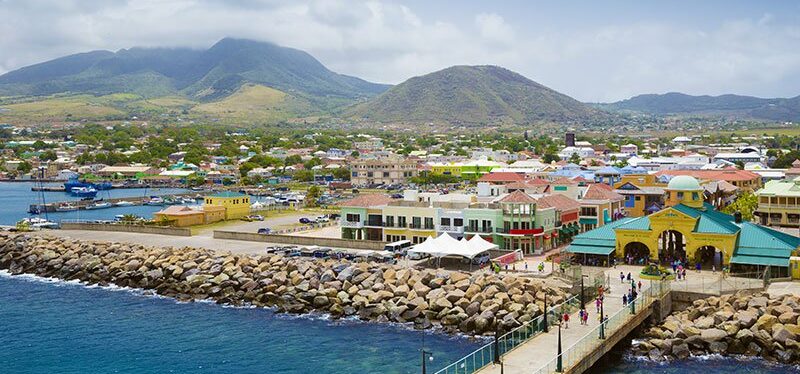Your cart is currently empty!
St. Kitts & Nevis Economy

Economy
Saint Kitts and Nevis is a twin-island federation whose economy is characterized by its dominant tourism, agriculture, and light manufacturing industries.[1] Sugar was the primary export from the 1940s on, but rising production costs, low world market prices, and the government’s efforts to reduce dependence on it have led to a growing diversification of the agricultural sector. In 2005, the government decided to close down the state-owned sugar company, which had experienced losses and was a significant contributor to the fiscal deficit.
St. Kitts and Nevis are heavily dependent upon tourism to drive its economy, a sector that has expanded significantly since the 1970s. In 2009 there were 587,479 arrivals to Saint Kitt’s compared to 379,473 in 2007, an increase of just under 40% in a two-year period, however the tourist sector decreased during the Global financial crisis and has only recently returned to pre-crash levels. In recent years the government has sought to diversify the economy via agriculture, tourism, export-oriented manufacturing, and offshore banking.
In July 2015, St Kitts & Nevis and the Republic of Ireland signed a tax agreement to “promote international co-operation in tax matters through exchange of information.” The agreement was developed by the OECD Global Forum Working Group on Effective Exchange of Information, which consisted of representatives from OECD member countries and 11 other countries in the Caribbean and other parts of the world.
Transport
Further information: Transport in Saint Kitts and NevisRobert L. Bradshaw International Airport on St KittsVance W. Amory International Airport on Nevis
Saint Kitts and Nevis has two international airports. The larger one is Robert L. Bradshaw International Airport on the island of Saint Kitts with service outside to the Caribbean, North America, and Europe. The other airport, Vance W. Amory International Airport, is located on the island of Nevis and has flights to other parts of the Caribbean.
The St. Kitts Scenic Railway is the last remaining running railroad in the Lesser Antilles.
Economic citizenship by investment
St. Kitts allows foreigners to obtain the status of St. Kitts citizen by means of a government-sponsored investment programme called Citizenship-by-Investment. Established in 1984, St. Kitts’ citizenship programme is the oldest prevailing economic citizenship programme of this kind in the world. However, while the programme is the oldest in the world, it only catapulted in 2006 when Henley & Partners, a global citizenship advisory firm, became involved in the restructuring of the programme to incorporate donations to the country’s sugar industry.
Citizenship-by-Investment Programmes have been criticised by some researchers due to the risks of corruption, money laundering and tax evasion. According to the official website of St. Kitts’ Citizenship-by-Investment Programme, they offer multiple benefits: “When you acquire citizenship under St. Kitts & Nevis citizenship programme, you and your family enjoy full citizenship for life, which can be passed on to future generations by descent. As citizens of St. Kitts & Nevis, you and your family are issued with passports which allow visa-free travel to more than 140 countries and territories worldwide, including all of the EU. Of course you have the right to take up residence in St. Kitts & Nevis as well as in most of the CARICOM member countries at any time and for any length of time”.
Each candidate must go through several legal steps and make a qualifying investment into the country and should complete certain legal requirements to qualify for citizenship under the investment program. There is a minimum investment that has to be made by the applicant, in either an approved real estate or in the Sugar Industry Diversification Foundation (a public charity), to qualify for the economic citizenship of St. Kitts and Nevis.
According to Henley & Partners, the requirements are as follows:
- An investment in designated real estate with a minimum value of US$400,000, plus the payment of government fees and other fees and taxes.
- A contribution to the Sugar Industry Diversification Fund of at least US$250,000, inclusive of all government fees but exclusive of due diligence fees which are the same for the real estate option.
According to Imperial & Legal, from 1 April 2018 St Kitts and Nevis government implemented a new investment option – Contribution to Sustainable Growth Fund (SGF). To qualify for citizenship of St Kitts & Nevis, applicants who choose to invest in SGF will need to make a one-off non-refundable contribution of $150,000 plus due diligence fees.








